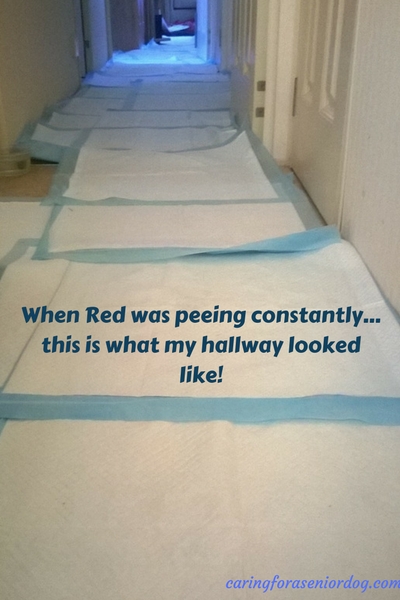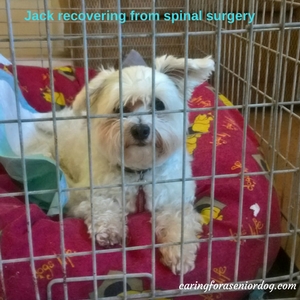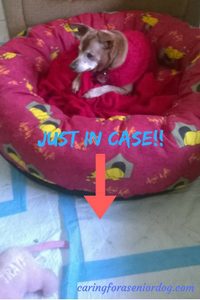
Perhaps not the most glamorous topic to discuss, but incontinence in older dogs is a reality for some, so let’s get to it!
Many people who have the pleasure of sharing their lives with senior dogs attribute any and all changes to the natural course of aging, urinary incontinence included. While that may be true in some cases, there are plenty of other possible causes, so changes of any kind should always signal a trip to the vet. A problem caught early has a  better chance of being fixed, handled or managed.
better chance of being fixed, handled or managed.
What is incontinence?
It is the inability to hold urine in the bladder, which is different from needing to pee more often because of disease or illness for example.
Who is at risk?
Incontinence can affect dogs of any age both male and female, but typically it is seen in middle aged to older female spayed dogs.
Causes of incontinence or an increased need to pee
Hormone deficiency
The most common cause, it occurs when there is a decrease in the production of estrogen and testosterone.
Muscular tissue at the base of the bladder, which a dog can control, prevents urine from leaking out. Estrogen in female dogs and testosterone in males is what strengthens that muscular tissue. When something affects the production of those hormones (spaying/neutering and the natural decrease in hormone production as a dog ages), the bladder sphincter weakens and urine will leak.
Red’s hormone issue
For a period of a few weeks several months ago my senior sweetie Red was peeing like crazy. She drank but I never noticed her drinking an excessive amount, yet she would pee constantly. As many times as I take her out in a day I couldn’t keep up, and had to keep pee pads on my floor. It was determined to be due to a hormone issue, so is now on medication for the rest of her life, unless my new holistic vet has an alternative recommendation!
Infection
A urinary tract infection (UTI) or bladder infection causes such a strong desire to pee, it can be hard to hold it, not to mention increasing the frequency your dog pees as well.
Red had 2 UTIs in quick succession, both times treated with antibiotics. When she got a third my vet recommended an ultrasound to see, literally, what was going on internally. He discovered the infection was higher up than is typical, so sent a urine sample off to the lab to determine the exact type of bacteria for a more targeted antibiotic. That one finally worked.
My 17 year old cat Night Night (RIP) had a couple of bladder infections before he was diagnosed with a tumour. It was distressing to watch the effect that infection had on him. He would go in and out of the litter box constantly, trying to pee. He was prescribed a course of antibiotics, but small traces of blood were still detected. When a second course failed, my vet recommended an ultrasound which revealed a bladder tumour.
Spinal or neurological problems
Spinal or neurological issues can cause a loss of bladder and bowel control, because the signals are having trouble getting through, if at all.
On August 22, 2016 over the course of just a few hours, our dog Jack lost the use of his back legs. An MRI showed a disc had exploded and surgery was performed immediately. Although he did not suffer from urinary  incontinence, he did experience short term fecal incontinence. Until he started regaining some movement in his back legs (the first tiny movement happened 3 weeks after surgery), Jack had no idea when he was pooping. We would be out walking him with a sling to support his back legs, and he would poop as he kept on going.
incontinence, he did experience short term fecal incontinence. Until he started regaining some movement in his back legs (the first tiny movement happened 3 weeks after surgery), Jack had no idea when he was pooping. We would be out walking him with a sling to support his back legs, and he would poop as he kept on going.
Behavioural issues
Stress or anxiety, often experienced more by older dogs, can lead to involuntary peeing. Possible reasons may include a touch of dementia, hearing or vision loss.
Saffy and stress incontinence
Incontinence due to stress was something I became familiar with when we adopted an 8 year old puppy mill rescue we named Saffy. Having been kept in a chicken coop her entire life, used only for breeding, you can’t image  the terror she felt at everything. Without going into a long story, suffice it to say she would pee whenever we approached her. Over time she started gaining some confidence so that became less of an issue.
the terror she felt at everything. Without going into a long story, suffice it to say she would pee whenever we approached her. Over time she started gaining some confidence so that became less of an issue.
Excessive water consumption due to certain diseases
Some dogs drink so much water their bladders can’t hold it all, no matter how often they go out.
Common conditions that cause excess drinking include:
Diabetes
Dementia
I include dementia under possible causes because dogs with dementia may:
Forget their housetraining and pee wherever and whenever
Go outside not realising/remembering what they’re supposed to do then pee when they come back in
Whether or not dementia can “officially” be classed under the incontinence heading is debatable, but I think it could be considered involuntary peeing.
Bladder stones
Tumours in the bladder
They’re rare (although my cat Night Night had it), they can happen and cause incontinence.
Signs your dog may be incontinent
- An obvious sign is your dog peeing a lot and seeming to forget her housebreaking training
- Redness of the skin/irritation from dripping urine
- Lots of licking of the vulva or penis area
- Bed may be wet and smell of pee because of leaking
Problems caused by incontinence
A looser opening to the bladder (caused by age and lower hormone production) makes it easier for bacteria to enter the body and cause infections. Which is what happened to my dog Red.
My vet explained because female dogs crouch when they pee, they are more susceptible to picking up bacteria. Now after Red pees, especially if she’s on the dirt path behind the house, I use a natural doggie wipe to reduce the  chances.
chances.
If urine is on the skin for a long period of time, it can burn and irritate.
The dogs that do not respond to medication, and surgery is not an option for whatever reason, leaking may continue to happen. Doggie diapers and pee pads can be an answer.
How it is diagnosed
Take your dog to the vet if you’ve noticed any of the following…
- Licking herself
- Drinking more
- Peeing more often and/or in larger volumes
- Accidents in the house
I recommend bringing a urine sample to the appointment if possible. It should be collected first thing in the morning mid stream (meaning let your dog pee a little before you collect the urine), in a clean container and do not refrigerate. Schedule the appointment as early in the morning as you can, as the sample should be tested within 2 hours of collection.
What to expect during the appointment
Your vet will have a chat about your concerns, what you’ve been noticing, when it started, how long it’s been going on, and will then examine your dog. He will analyse the urine and quite possibly have a diagnosis, or at least the start of one on the spot. Whether he’d like to take blood, or has reason to believe further testing should be done right away, is of course up to him.
Preventing incontinence
Other than behavioural incontinence which may be helped with training or a chat with a behaviourist, there’s nothing to prevent it only to treat it once it has started.
Treatment options
The treatment plan will not only depend on the cause, but also the type of medicine your vet practices, meaning traditional or holistic.
Options can include:
- A change in diet
- Antibiotics
- Hormone therapy
- Surgery
- Homeopathic/herbal remedies
(NOTE: please don’t run out and give your dog remedies you’ve researched online. If you are interested in treating your dog naturally, make an appointment to speak with a holistic vet).
Proin
One of the members of my FB group, Senior Dog Care Club gives her dog a prescription drug called Proin, which helps manage urinary incontinence. She says it has worked wonders and shared this with the group. Her dog is 41 lbs and gets 1/4 of a tablet twice a day.
Living with incontinence
Putting blankets or towels on your dog’s bed makes clean up less problematic. It’s easier to throw blankets or towels in the wash than a dog bed, and they dry quicker too.
Pee pads around the bed and the area where she sleeps can prevent carpet staining. I should have bought stock in  a pee pad company I use so many, but I couldn’t be without them.
a pee pad company I use so many, but I couldn’t be without them.
There are also products like doggie diapers you might want to consider.
If necessary take your dog for more frequent pee breaks, and be sure that includes first thing in the morning, after naps and before bed.
Keep an eye on her skin and deal with any irritations immediately. Left untreated a minor spot can become a full blown infection.
I don’t recommend reducing water intake as that could have dangerous ramifications.
In this post “Dog Incontinence Products” you’ll find lots of products to choose from to help you deal with this issue.
Incontinence in older dogs – conclusion
I know from my own experience how frustrating all that extra peeing can be, and how tough it is seeing your dog in discomfort. Don’t let it go on undiagnosed, as the sooner you know the cause the sooner you can start working towards a solution.
Have you had to deal with incontinence in older dogs? What caused it and what solution did your vet recommend? Did you have to make many adjustments to your routine, living situation…?
I would love to hear your experiences so leave them in the comments section below, or on my Facebook page.

 What You Need to Know About Vestibular Disease in Dogs
What You Need to Know About Vestibular Disease in Dogs
I know the first photo probably isn’t meant to be funny, but gosh I had to laugh. It reminded me of our days with our stubborn and happy-go-lucky Gizmo. We adopted him as a senior who, due to his Cushings, always had some bladder problems. They got worse as he aged and developed other ailments. Thanks for another informative and personal article.
Hi Allison, glad you had a good laugh I’ll tell you it wasn’t to be believed!! On one hand covering your entire floor in pee pads (you only saw one little hallway in that picture!!) is somewhat comforting. You know if you’re a bit late coming home, or Red just had to pee you won’t see that stain on your carpet you’re half expecting. On the other hand it did my head in – cluttered house, cluttered mind or however the expression goes. Thank goodness those days are over and she’s doing well, but I’m grateful to whoever invented the pee pad. I never leave home without them.
When Gizmo started to pee regularly in the house, we partitioned an area off for him to stay. Then we covered that area in pee pads and towels. He also had to wear doggy diapers. It was an exhausting experience! When we lost him, we were emotionally drained both from his illness and from having lost our spunky terrier.
I used to partition a section for Red at night when she preferred to sleep in the living room, then covered it with pee pads. I must admit I’ve never put a doggie diaper on her, I’m quite sure she wouldn’t be pleased. It really is an exhausting experience, and I don’t think we realise just how exhausting it is until we say goodbye and like you say, you’re just emotionally drained. Gizmo was lucky to have you, not everyone would have cared for him the way you did.
My 13-year-old Jack Russel spayed female. began wetting the bed (where we both sleep) in early September. She also started to leak a little when really active. Proin seemed to help, but not a lot and we got in the habit of going out in the middle of the night. After 6 weeks it seemed to stop working altogether. Finally, after a new vet, we put her on hormone treatment. That helped but lately she has had accidents. For a month she stayed mostly dry, but the last few weeks it’s getting worse. Twice yesterday, once at nap time and overnight. She goes out a dozen times a day as it is.
So, we have been managing this for 5-1/2 months. I would say at this point, she is no better than she was in September. She is old, almost deaf, poor eyesight, and grumpy most of the time. All of that is true of me as well.
I guess I’m sharing this for myself as well as anyone who reads it. Not every dog is going to get better. Not everyone can stand by with pads and deal effectively with a dog that can’t hold its urine. Is 6months long enough to try? What do you do when it’s your best friend, you live alone, you are retired and that little dog has been with you ever single day for the last 3 years since you rescued her? There just comes a time in every dog’s life when it’s the only thing left to do.
Hi Greg. Senior dogs can definitely be a challenge, especially when they accidentally mess in the house on a regular basis. It’s true that not all dogs get better and how long one can manage the condition vaires for person to person. Some people have successfully managed their dog’s incontinence by using diapers for years. Others, after talking with their vet about quality of life, determine that it’s time to say goodbye.
This is so difficult to go through. As you said, our pets get older and in some cases are not going to get better, and it is hard to know what to do and when to do it. We have entered this ‘phase’ of our dog Cooper’s life recently. I’m afraid I don’t have any good advice other than talk to your vet and listen to your heart. You are in my thoughts and prayers.
Pamela
Thank you for this, 2 years later and it helped a stranger. I have a 13 year old blind and deaf Jack with the SAME issues and horrendous separation anxiety. I made her end of life appt this morning. She’s perfect on bloodwork and hormones, just sucks. Thank you, I needed this.
I have noticed that there are wet spots when my 14 year old Yorkie gets up from his bed. I think he is leaking small amounts of urine. Had him in my lap to put in his ear drops and had a little wet spot on my pants leg when he jumped down. Not seeing signs of any distress with him. He still uses the doggie door and pees outside.
Hi Linda. The first phase of incontinence in dogs often appears as they are sleeping. Their muscles are the most relaxed then and urine can leak out. So your assessment seems accurate.
Hello!
I never thought I was alone with my “nitetimeleaky dog syndrome” and I know now I’m not! Sammie is our great old female lab, who spends most if her daytime hours outdoors, so if she’s leaking then I don’t know it. However, her bed now requires so much of my attention and never smells good. I have a waterproof mattress cover and keep a small clean rugs over it that are easily washed. Bless her heart, bathing her in the winter is not possible either, so I just spray her with a good deodorant. She can’t get in and out of the tub now, so that’s the best I can do. I will try an addition to her diet, but I’m feeling pretty sure it had little to do with what she eats. It’s tiresome and I’m not in the greatest health following Covid (fully vaxxed), and a bad reaction to my last vaccination. That said, the old gray mare ain’t what she u sed to be either!!! So, I’m doing the best I can and will try a supplement soon. Thanks for listening!!!! Any recommendation will be wonderful.
gail
” _))